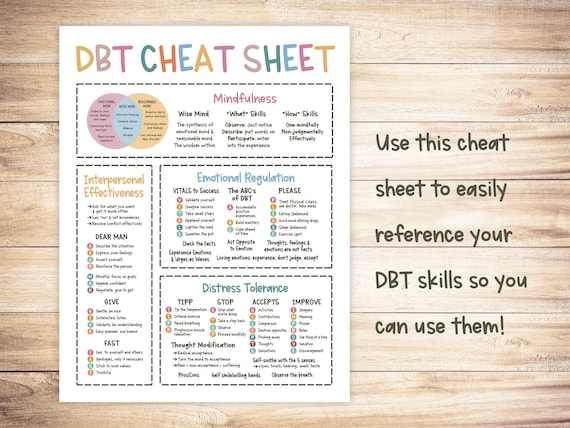
Introduction to DBT Skills
Understanding Emotional Dysregulation
Emotional dysregulation is the inability to manage and respond to emotions effectively. It can lead to impulsive behavior, mood swings, and difficulties in relationships. DBT, developed by Dr. Marsha M. Linehan, offers a structured approach to address emotional dysregulation.
The Origin of Dialectical Behavioral Therapy
DBT combines principles of cognitive-behavioral therapy and mindfulness practices. It was initially designed to help individuals with borderline personality disorder but has since proven effective for a wide range of emotional challenges.
Mindfulness Skills
The Power of Mindfulness
Mindfulness involves being fully present in the moment, without judgment. It helps individuals become aware of their thoughts and emotions, paving the way for better self-regulation.
Mindfulness Meditation Techniques
Meditation exercises, such as body scans and focused breathing, can enhance your mindfulness skills, allowing you to detach from overwhelming emotions.
Observing and Describing Emotions
By observing and describing emotions in a nonjudgmental way, you gain clarity about your feelings, which is crucial for emotional regulation.
Emotion Regulation Skills
Identifying and Labeling Emotions
DBT teaches you to identify and label your emotions accurately, making it easier to address them effectively.
Increasing Positive Emotions
Learn strategies to boost positive emotions, like practicing gratitude and engaging in enjoyable activities.
Reducing Vulnerability to Negative Emotions
Discover techniques to reduce emotional vulnerability, such as self-care practices and emotion regulation exercises.
Distress Tolerance Skills
Radical Acceptance
Radical acceptance involves acknowledging that some situations are beyond your control and learning to accept them without judgment.
Self-Soothe Techniques
Explore self-soothing methods, like using your five senses to comfort yourself during distressing moments.
STOP Skills: A Crisis Survival Strategy
STOP stands for Stop, Take a Step Back, Observe, and Proceed Mindfully. This strategy helps you manage crises effectively.
Interpersonal Effectiveness Skills
Effective Communication
Master communication skills to express your needs, wants, and boundaries assertively.
Setting Boundaries
Establishing healthy boundaries is essential for maintaining balanced relationships.
Balancing Priorities: DEAR MAN
DEAR MAN is an acronym that guides you through assertive communication in challenging interpersonal situations.
Putting DBT Skills into Practice
Creating a Personal DBT Plan
Craft a customized DBT plan that addresses your unique emotional challenges and goals.
Tracking Progress and Celebrating Success
Regularly monitor your progress and celebrate even small victories on your journey toward emotional regulation.
Real-Life Success Stories
Read inspiring testimonials from individuals who have successfully applied DBT skills to transform their lives.
Conclusion
In conclusion, DBT skills provide a powerful roadmap to conquer emotional dysregulation and live a more fulfilling life. By embracing mindfulness, emotion regulation, distress tolerance, and interpersonal effectiveness, you can become the master of your emotions and navigate life’s challenges with grace.
FAQs
- Is DBT suitable for everyone?
- DBT can benefit individuals dealing with emotional dysregulation, but it’s essential to consult a mental health professional for personalized guidance.
- How long does it take to see results with DBT?
- Results may vary, but many people experience improvements within a few weeks of consistent practice.
- Can I practice DBT skills on my own, or do I need a therapist?
- While self-help resources are available, working with a trained DBT therapist often leads to more significant progress.
- Are DBT skills only for managing negative emotions?



